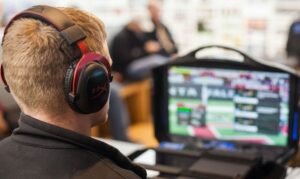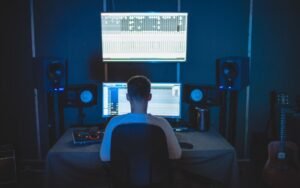Who Made AI Music
Artificial intelligence (AI) has revolutionized various industries, and the music industry is no exception. With advancements in technology and machine learning, AI programs can now compose, produce, and even perform music. But who are the creators behind this innovative technology?
Key Takeaways
- AI has transformed the music industry by enabling the creation of music through machine learning algorithms.
- The pioneers in AI music include companies like Jukedeck, Amper Music, and OpenAI.
- AI music composers offer a range of customizable options to create music for various purposes and genres.
- Despite the rise of AI music, human involvement is still necessary to ensure creativity and emotion in music production.
One of the companies at the forefront of AI-generated music is Jukedeck. Founded in 2012, Jukedeck developed an AI platform capable of creating original compositions in seconds. *The AI system analyzes various musical elements, such as melody, rhythm, and instrumentation, to produce unique compositions.* Users can customize the generated music by adjusting style, tempo, and duration to suit their needs.
Amper Music is another prominent player in the AI music landscape. Their AI platform provides composers, filmmakers, and content creators with a toolset to generate AI music for their projects. *Amper’s AI analyzes millions of musical data points to compose music that matches the desired mood and style.* With Amper, users can specify the genre, instruments, and other parameters to create a tailored music composition.
| Companies | Year Founded | Key Features |
|---|---|---|
| Jukedeck | 2012 | Instant composition, customizable options |
| Amper Music | 2014 | Mood and genre customization, collaboration features |
| OpenAI | 2015 | Advanced composition, AI-generated lyrics |
OpenAI, a research organization, has also made significant contributions to AI music. They developed an AI model called MuseNet, capable of composing music spanning multiple genres and styles. *MuseNet’s algorithms analyze vast musical datasets to generate original compositions that can emulate the styles of famous artists.* OpenAI’s project demonstrates the potential of AI in the creation of intricate, expressive music.
Machine vs. Human Collaboration
While AI music technology has shown impressive capabilities, it is important to note that human involvement remains essential in the creative process. *AI programs excel in generating music based on predefined patterns and datasets, but they lack the intuitive and emotional understanding that human composers possess.* Collaborations between humans and AI can lead to groundbreaking results, combining the efficiency and limitless possibilities of AI with human creativity and emotion.
| AI Compositions | Human Compositions |
|---|---|
| Efficient generation | Unique perspective and emotional depth |
| Endless possibilities | Intuitive understanding of musical nuances |
| Quick iteration | Artistic interpretation and improvisation |
AI music has the potential to enhance various aspects of the music industry, from composition to sound design and even live performances. The collaboration between humans and AI opens up new artistic possibilities and challenges traditional notions of music creation. As technology continues to advance, the music industry must embrace AI as a tool to augment human creativity rather than replace it.
- AI music creators bring efficiency and limitless possibilities to music production.
- Human composers provide unique perspectives and emotional depth in compositions.
- AI-generated music can be tailored to specific moods, genres, and contexts.
- AI music is a collaborative process, combining the strengths of both humans and machines.
As AI continues to evolve, we can expect even more breakthroughs in AI-generated music. The fusion of technology and creativity has the potential to reshape the music landscape, offering exciting opportunities for artists and listeners alike.

Common Misconceptions
1. AI Music is Solely Created by Machines
One common misconception about AI music is that it is solely created by machines without any human intervention. Although AI algorithms and models play a significant role in generating music, humans are still involved in the creation process in various ways:
- Human musicians and composers provide the initial input and inspiration for AI systems, guiding them with their expertise.
- AI algorithms learn from massive datasets of existing music, which are collected and curated by human experts.
- Human engineers and developers train and fine-tune the AI models, adjusting parameters and evaluating the generated music.
2. AI Music Lacks Creativity and Originality
Another misconception is that AI music lacks creativity and originality because it is generated by algorithms. However, AI systems can produce remarkably creative and original compositions with the right training and input:
- AI algorithms can generate unique melodies and harmonies that human musicians may not have thought of.
- By exploring vast musical databases, AI systems can combine different genres and styles, resulting in innovative and unexpected compositions.
- AI music can provide new perspectives and push creative boundaries by challenging conventional musical norms.
3. AI Music Threatens Human Musicians and Artists
There is a misconception that AI music poses a threat to human musicians and artists, potentially replacing them in the industry. However, the relationship between AI and human musicians is more collaborative than competitive:
- AI systems can be used as powerful tools to aid human musicians and expand their creative capabilities.
- AI-generated music can be used as inspiration or a starting point for human musicians, helping them explore new directions.
- Ultimately, human musicians bring emotions, intuition, and unique perspectives to music that AI systems cannot replicate.
4. AI Music Cannot Evoke Emotional Responses
Some people believe that AI-generated music lacks the ability to evoke emotional responses from listeners. However, AI systems can indeed create music that elicits strong emotional reactions:
- Using sentiment analysis and emotion recognition algorithms, AI can compose music that resonates with specific moods or feelings.
- By analyzing patterns and structures in existing emotionally evocative music, AI algorithms can learn to generate compositions in a similar vein.
- AI music can surprise and move listeners by creating unexpected emotional connections through innovative melodies and harmonies.
5. AI Music is a Replacement for Human Creativity
One misconception is that AI music is a complete replacement for human creativity in the music industry. However, AI systems are just another tool in the creative process, complementing human ingenuity:
- Human musicians have the ability to infuse their personal experiences, emotions, and cultural influences into their compositions, creating unique musical expressions.
- AI music can serve as a source of inspiration for human musicians, sparking new creative ideas and challenging them to explore uncharted territories.
- Collaborative efforts between AI systems and human musicians can result in groundbreaking and innovative musical works that neither party could achieve alone.

Artificial Intelligence Music Composers
Over the past decade, Artificial Intelligence (AI) has made remarkable advancements in various industries, including music. AI-powered algorithms have enabled machines to compose original pieces of music, blurring the line between human and machine creativity. The following charts provide fascinating insights into the pioneers and popular tools behind AI music composition.
Pioneers of AI Music Composition
| Name | Organization | Years Active | Notable Works |
|---|---|---|---|
| David Cope | University of California | 1981-present | Emily Howell |
| Eduard Artemyev | Independent | 1979-present | Siberiade |
| Holly Herndon | Stanford University | 2011-present | PROTO |
| Iannis Xenakis | Independent | 1953-2001 | Metastasis |
Popular AI Music Composition Tools
| Tool | Developer | Year Released | Features |
|---|---|---|---|
| Magenta | 2016 | Music generation, style transfer | |
| Jukedeck | Jukedeck | 2012 | Customizable music generation |
| AIVA | AIVA Technologies | 2016 | Symphonic music composition |
| Flow Machines | Sony Computer Science Laboratory | 2012 | Songwriting assistance |
Types of AI Music Composition
AI music composition encompasses various styles and techniques. The table below highlights different types of AI-generated music:
| Type | Description |
|---|---|
| Baroque | Emulates the ornate musical styles of the late 17th century. |
| Experimental | Pushes musical boundaries, exploring unconventional sounds. |
| Classical | Composes symphonic or chamber music reminiscent of the classical era. |
| Electronic | Integrates electronic sounds and beats, often associated with EDM genres. |
AI Composed Music in Popular Culture
The impact of AI-generated music extends beyond mere experimentation. Well-known songs and compositions have incorporated elements produced by AI algorithms. The following examples showcase AI’s presence in popular culture:
| Song/Composition | AI Component | Artist/Composer |
|---|---|---|
| Emergency On Planet Earth | Drums | Jamiroquai |
| Aerial Boundaries | Guitar harmonies | Michael Hedges |
| Taste the Feeling | Vocals | Avicii |
| Hello World | Chord progressions | Rachael Sage |
AI Music Composition Challenges
Although AI music generation offers exciting possibilities, there are challenges to overcome. The table below showcases some significant hurdles in the field:
| Challenge | Description |
|---|---|
| Originality | Avoiding repetitive or derivative compositions to foster creativity. |
| Emotionality | Creating music that evokes emotions and resonates with listeners. |
| Authenticity | Ensuring the music’s authenticity without sounding artificial or robotic. |
| Collaboration | Facilitating seamless collaboration between AI systems and human musicians. |
AI Music Artists and Collaborators
| Artist/Collaborator | Domain | Notable Works |
|---|---|---|
| Portrait XO | Visual artist | AI-generated immersive art experiences |
| Kim Laughton | Graphic designer | AI-inspired visual materials and installations |
| Emily Howell & The Artificial Intelligence Band | Music composition | Original symphonic compositions |
| Lawrence Lek | Video game art | AI-generated soundtrack for video games |
The Influence of AI Music Composition
AI music composition has emerged as a groundbreaking phenomenon, transforming the music industry’s landscape. It has enabled new creative possibilities, innovative collaborations, and the exploration of uncharted musical territories. As AI continues to evolve, it will be fascinating to witness the continued fusion of human and machine ingenuity in the realm of music.
Frequently Asked Questions
FAQs about Who Made AI Music
FAQs
-
What is AI music?
AI music refers to music that is composed or produced by artificial intelligence systems, often using complex algorithms and machine learning techniques.
-
Who made the first AI-generated music?
The first AI-generated music is often credited to the computer program called ILLIAC Suite, which was developed by Lejaren Hiller and Leonard Isaacson in 1955.
-
What are some popular AI music composers or platforms?
Some popular AI music composers or platforms include Amper Music, Jukedeck, OpenAI’s MuseNet, and Google’s Magenta.
-
How does AI generate music?
AI generates music by analyzing vast amounts of existing music data and using machine learning algorithms to recognize patterns, harmonies, and structures. It then creates original compositions based on these learned patterns.
-
Can AI compose music in different genres?
Yes, AI can compose music in various genres. By training AI models on diverse datasets, it can learn the characteristics of different musical genres and generate compositions that align with those genres.
-
Does AI music replace human composers?
AI music does not replace human composers. It is meant to augment human creativity and provide new tools for musicians and composers. Human involvement is still crucial in curating, refining, and adding unique elements to AI-generated music.
-
Can AI compose music that evokes emotions?
AI is capable of composing music that evokes emotions. By analyzing emotional patterns in existing music, AI systems can learn to create compositions that elicit specific emotional responses.
-
What are the ethical considerations of AI music?
Some ethical considerations of AI music include copyright issues, attribution of AI-generated compositions, potential biases in training data, and the impact on professional musicians. These considerations require ongoing discussions and guidelines.
-
Is AI music improving over time?
Yes, AI music is improving over time. As AI technology advances, the quality and sophistication of AI-generated music continue to improve, producing compositions that are increasingly difficult to distinguish from those created by human composers.
-
What is the future of AI music?
The future of AI music holds exciting possibilities. It can be used to aid musicians in the creative process, generate personalized music experiences, and even push the boundaries of musical innovation by exploring new compositions that stretch conventional boundaries.




